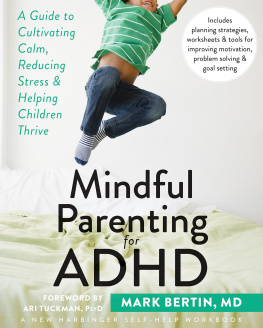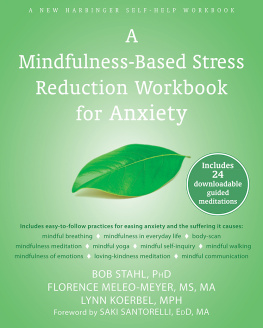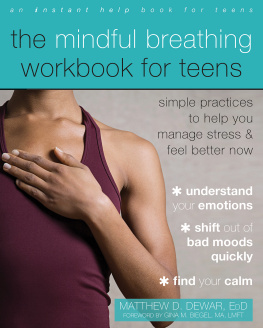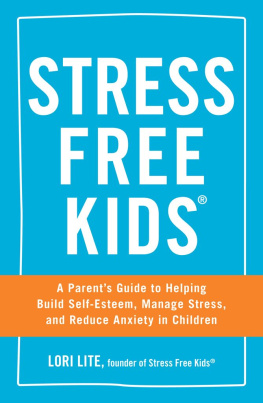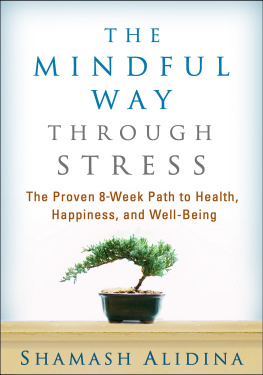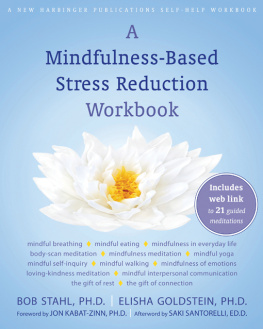Acknowledgments
Many people have graciously given of their time and talents to help inform the work contained in this book. I would first like to thank my patients and their parents who were open to exploring new approaches in medicine with me. I have learned as much from you as you have learned from me.
I want to express my thanks to Dr. Jon Kabat-Zinn, for his tireless efforts in educating the world about mindfulness-based stress reduction (MBSR). I consider it a privilege to help to spread the word about the benefits of MBSR and to help make it accessible to children and their families.
I wish to thank the team of MBSR instructors at Duke Integrative Medicine who brainstormed strategies to help adapt MBSR skills for children and supported my desire to bring this work forth: Mary Matthews Brantley, Dr. Maya McNeilly, Jeanne van Gemert, and Dr. Ron Vereen. A special thank-you goes to Duke Integrative Medicines MBSR Director, Dr. Jeffrey Brantley. To you I owe a deep bow of gratitude for so freely sharing your wisdom with me and serving as such a wonderful role model, mentor, and friendMahalo Nui Loa.
I would also like to thank all those who played a part in helping me to establish a firm foundation in the field of integrative medicine: the leadership team of the Associate Fellowship Program in Integrative Medicine at the University of Arizona, Dr. Andrew Weil, Dr. Victoria Maizes, and Dr. Tieraona Low Dog; my treasured colleagues and friends in the Fellowship class of 2006; the visionaries at the Bravewell Collaborative, along with Dr. Sam Moon and Dr. Tracy Gaudet of Duke Integrative Medicine, for giving me the opportunity to train in integrative medicine; and my fearless and pioneering leaders in the department of pediatrics at Duke, Dr. Joseph St. Geme (chairman), Dr. Dennis Clements, and Dr. Elizabeth Landolfo. Thank you all for your generous support of my unique career path. To Dr. Larry Rosen, Dr. Sunita Vohra, and Dr. Tim Culbert, thank you for so generously sharing your wisdom and expertise with me; I appreciate each of you and value your friendship. And to Dr. Kathi Kemper, my mentor, colleague, and very dear friend, thank you for forging this path for pediatricians to provide truly holistic care to children and families.
I am grateful for the openhearted collaboration of Marius Kluenger, Leslie Chapman, Jennifer Davis, Mike Belden, Kate Whetten, and Luililiaeli Mfangavo (affectionately known as Mama Lui) on our efforts to bring mindfulness to the children at Glenn Elementary school in Durham, N. C., and to the orphans and caregivers in Moshi, Tanzania.
Thanks so much to the wonderful editors and staff at New HarbingerWendy Millstine, for seeing the possibilities in a book such as this; Tesilya Hanauer, for your patience and guidance; and Jess Beebe and Karen Stein, for your thoughtful and gentle suggestions to refine and improve this work.
Finally, I would like to thank my family. Your love and support of my work has been nothing short of amazing. I am truly blessed to have such phenomenal people in my life. To my parents, George and Dorothy Bailey, thank you for loving me so generously: your love gave me the wings I needed to fly. I am fortunate to have a second set of parents, Bob and Elaine Shelton: your guidance and support over the years have meant more to me than you could ever imagine. To my son, Philip, you have been my greatest teacher in this lifetime thus far. You are an incredible gift to me and I am so very proud of the man and father that you have become. To my beloved Sharon, words cannot express how much I appreciate you: thank you for your endless encouragement and wonderful spirit and for choosing to share this journey with me.
Chapter 1. Understanding Stress and the Mind-Body Connection
There is no question that the things we think have a tremendous effect on our bodies. If we change our thinking, the body frequently heals itself.
C. Everett Koop, MD, Former Surgeon General of the United States
Our thoughts create our reality. Much of the stress we feel does not come from the life event or situation that occurs but instead results from what we make the event mean to us. It is our experience of life that translates into our joys and sorrows. The way we think about something and the value we assign to it (positive or negative) affects our mind, and that ultimately has an impact on the physical body. Lets take a look at how the mind and body are connected and how stress can affect that connection.
Stress in Kids Is on the Rise
Stress is a part of life. It affects each of us and at every stage of life. While most people acknowledge that stress affects adults, many are unaware of the stress experienced by children on a daily basis. Movies and television programming display provocative images, prematurely exposing children to inappropriate sexual content. Video games, computers, cell phones, television, and extracurricular activities provide a myriad of options to occupy our kids time. Overscheduled days and continuous stimulation place an incredible amount of stress and pressure on our kids.
Stress has been generally thought to be rare in childhood, but many studies are finding that kids experience moderate to extreme levels of stress in everyday life (American Psychological Association 2007). Pressure to do well in school, peer relationships, and family financial concerns are among several issues that serve as sources of stress for children.
Keep the Lines of Communication Open
If you are like most parents, you probably feel that by keeping your own worries from your child youre shielding him from stress; however, in talking to children in my practice, I find that the opposite is often true. Kids sense when their parents are worried. Children often accidentally overhear discussions about financial difficulties where parents are talking about how they are going to pay the bills this month, for example. And when your child doesnt know what is going on, he may be more likely to fill in the detailsperhaps erroneouslyon his own. This can lead to feelings of anxiety or self-blame for whats perceived as a parents distress.
Instead of unintentionally adding to your childs stress by keeping information hidden, share with him whats going on. He doesnt require many detailsjust enough to reassure him that he is safe and secure. Providing general information about the events affecting your family and talking to your child about your own feelings that result from stress is a good first step in beginning the dialogue. You might start the discussion like this:
Dad: You may have noticed that Ive been working a lot more lately. I know I havent been around as much, and Im tired and a little grumpier when I get home. I worry sometimes that I dont have enough money to give you everything that you want. I just wanted you to know that Im working hard to make sure I can provide the things that we needa safe place to live and enough food to eat. I miss spending time with you. Things are a little hard right now but I know they will get better. What kinds of things do you worry about?
Then listen to what he has to say. Communicating honestly about your concerns and worries demonstrates the importance of talking about whats bothering you. Be patient if your child doesnt have anything to share initially. With time and proper role modeling, he will understand that it is safe to talk about his worries and the feelings surrounding them. Remember that he will be watching you, looking for signs of reassurance that all is well. Learning to cope with the stress in your life in a healthy way builds confidence in your child that he can do the same. Despite what we may like to believe, kids place a greater emphasis on what we do than on what we say.
An Everyday Occurrence



